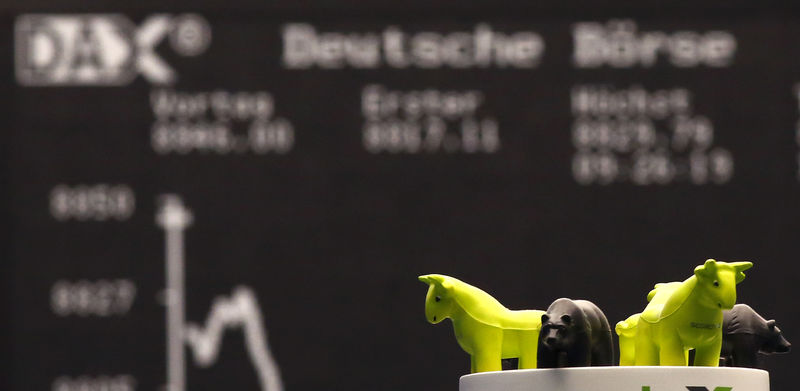By Peter Nurse
Investing.com - European stock markets weakened Thursday, with risk sentiment fragile given mounting fears of a global recession in the wake of aggressive interest rate hikes by the Federal Reserve.
By 03:55 AM ET (0755 GMT), the DAX in Germany traded 1.6% lower, the CAC 40 in France fell 1.5%, and the UK’s FTSE 100 dropped 0.9%.
Data released Thursday showed business activity in the Eurozone’s two largest economies, Germany and France, suffered a sharp loss of momentum at the end of the second quarter, raising concerns about an economic slowdown in the region.
France's key services sector shrank to a five-month low in June, with the flash purchasing manager index falling to 54.4 points, down from 58.3 in May, while the flash PMI index for France's manufacturing sector also slumped to 51.0 points - the lowest level in 19 months.
In Germany, the flash PMI for services fell to 52.4 in June from May's final reading of 55.0, and the manufacturing index dropped to 52.0 from May's final reading of 54.8.
European equity indices had already received a weak handover after U.S. Federal Reserve chair Jerome Powell had stated that the central bank was "strongly committed" to bringing down inflation, adding that a recession is “certainly a possibility” on the first day of his two-day testimony to Congress.
“The narrative in financial markets seems pretty clear. Inflation needs to be addressed and given that supply-side factors show no signs of easing, central banks are going to have to take the steam out of demand by tightening monetary policy,” said analysts at ING, in a note. “Whether that slowdown turns into a soft-landing or a recession remains to be seen.”
Adding to the concerns in Europe is the ongoing war in Ukraine, the associated sanctions on Russian crude, and a surge in gas prices as Moscow reduces its supply.
Germany, Europe’s largest economy, is set to trigger the second phase of its three-phase plan to guarantee security of supply later Thursday, according to German newswire dpa, moving a step closer to rationing supplies of natural gas, fearing a total cut-off of supplies from Russia.
Oil prices weakened Thursday, continuing the recent selloff on concerns the monetary tightening by the Federal Reserve to curb rampant inflation will prompt a sharp economic slowdown in the U.S., the largest consumer of crude in the world.
Additionally, President Joe Biden called on Congress to pass a three-month suspension of the federal gasoline tax to help combat record prices at the pump.
Wednesday’s U.S. crude supply data from the American Petroleum Institute showed a build of 5.6 million barrels for the week ended June 17.
The U.S. Energy Information Administration’s weekly oil data will be delayed until at least next week due to systems issues.
By 03:55 AM ET, U.S. crude futures traded 1.8% lower at $104.31 a barrel, while the Brent contract fell 1.4% to $110.13. Both benchmarks fell around 3% in the previous session, dropping to their lowest levels since mid-May.
Additionally, gold futures rose 0.1% to $1,839.60/oz, while EUR/USD fell 0.6% to 1.0506.
